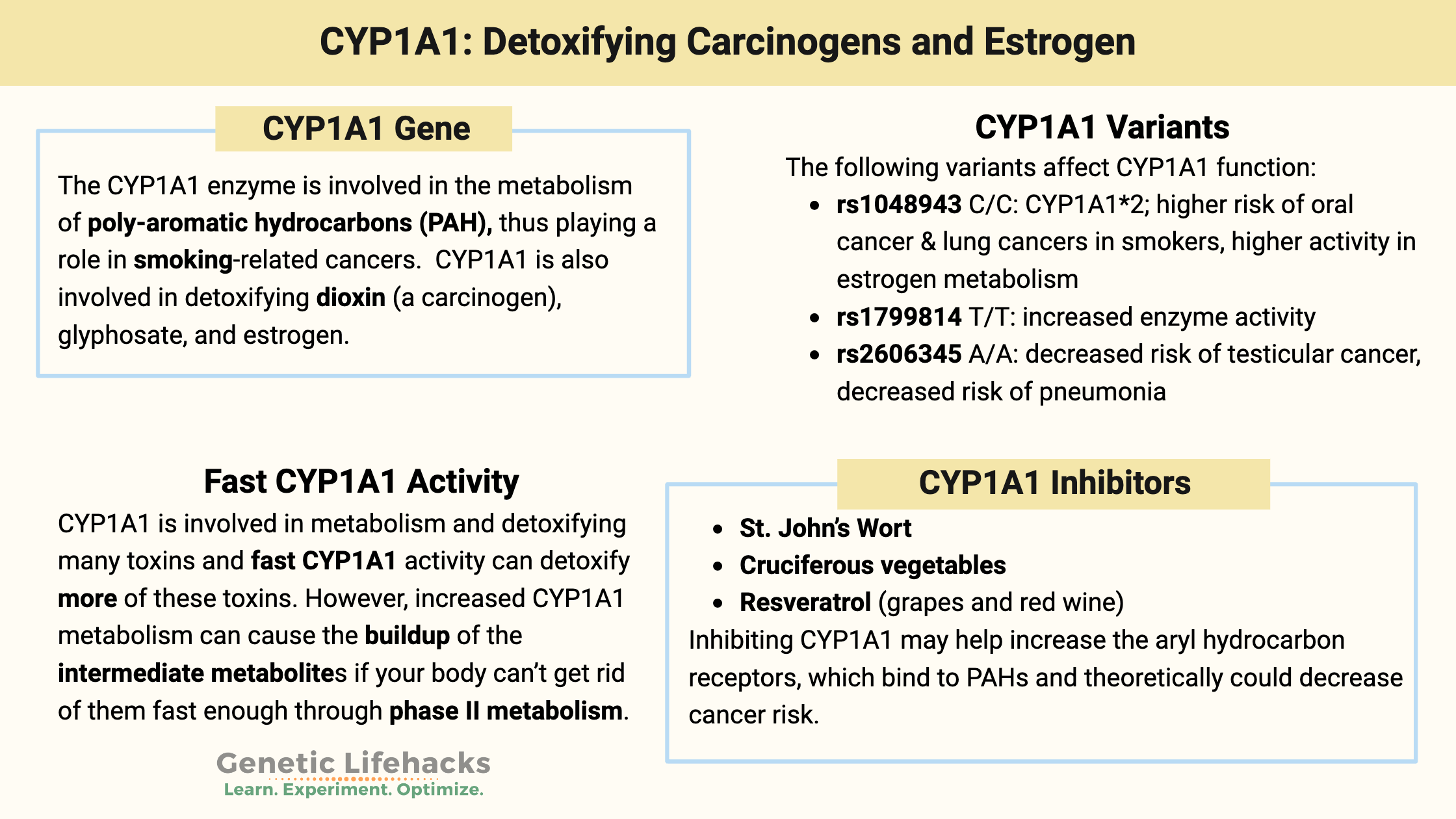Key takeaways:
~ The CYP1A1 enzyme metabolizes several toxins as well as naturally produced hormones.
~ It is also involved in the immune response in the intestines.
~ CYP1A1 genetic variants impact your detoxification of certain substances.
Members will see their genotype report below, plus additional solutions in the Lifehacks section. Join today.
CYP1A1 and Metabolism of Estrogen, Cigarette Smoke, and More
Genetic variants in the CYP1A1 gene are linked to a number of different health conditions, including an increased risk for estrogen-related cancers and an increased risk for lung cancer in smokers.
A quick overview of phase I detoxification :
Everything you eat or take (like medication) is absorbed in the intestines and taken to the liver.
- This allows the liver to detoxify anything harmful that you’ve eaten, and it also transforms nutrients into forms that you need.
- Fat-soluble toxins are made water-soluble.
- Then the toxin can be transformed and eliminated (mainly through the kidneys).
Related article: Overview of Phase I and Phase II detoxification
CYP1A1: What does it do?
The CYP450 (cytochrome P450) family of enzymes metabolizes or breaks down thousands of different compounds. CYP1A1 is one member of the CYP family of enzymes that are involved in metabolizing lots of different toxins as well as substances the body makes.
Toxins metabolized by CYP1A1:
The CYP1A1 enzyme is involved in the metabolism of poly-aromatic hydrocarbons (PAH) in the intestines, thus playing a role in smoking-related cancers from the activation of the aromatic hydrocarbons. In addition to cigarette smoke, aromatic hydrocarbons are also found in wood smoke, vehicle exhausts, asphalt, and charred meats.
CYP1A1 is also involved in detoxifying dioxin, which is a persistent organic pollutant that is carcinogenic.[ref]
A study on workers in China showed that those with CYP1A1 variants had lower acetylcholinesterase levels due to glyphosate (RoundUp ingredient) exposure. Lower acetylcholinesterase was assumed to be a marker of liver damage.[ref]
Endogenous substances metabolized by CYP1A1:
CYP1A1 is also involved in the metabolism of estrogen, specifically 17β-estradiol, as well as arachidonic acid and DHA (polyunsaturated fatty acids).
CYP1A1 is also utilized in the metabolism of melatonin.[ref]
New research points to a role in immune homeostasis in the intestines.[ref] Toll-like receptor 2 (TLR2) is part of the immune system that is active in the intestines and interacts with the gut microbiome. TLR2 activation increases CYP1A1 activity in the intestines, which then in turn can help with detoxification of ingested toxicants.[ref]
Medications metabolized using the CYP1A1 enzyme:
- Olanzapine[ref]
- Granisetron
Fast and slow CYP1A1 metabolism:
There are several genetic variants of CYP1A1 that can change the speed at which your body will metabolize substances.
- Increased CYP1A1 metabolism can cause the buildup of the intermediate metabolites if your body can’t get rid of them fast enough through phase II metabolism.
- Increased CYP1A1 activity can also increase the degradation of the aryl hydrocarbon receptor, which is an important mechanism for binding poly-aromatic hydrocarbons.[ref]
CYP1A1 Genotype Report
Lifehacks:
Higher CYP1A1 activity is going to be detrimental when exposed to PAHs (such as in cigarette smoke and smog). But, higher CYP1A1 activity is going to break down estradiol faster, which may be beneficial in estrogen metabolism, depending on your other estrogen-related genes.
Stop smoking:
People with the CYP1A1*2 allele are at a higher risk for lung cancer and definitely, should avoid cigarette smoke. So if you need yet another reason to stop smoking, this would be a big one.
Eat your veggies:
One study found that people who carried the CYP1A1*2 variant had a greater reduction in colon cancer risk with a diet high in polyphenols (found in veggies and fruit) than those without the variant.[ref]
Grapefruit juice also inhibits CYP1A1.[ref]
Supplements and CYP1A1:
Related Articles and Topics:
CYP2C9: Genetic Variants and Drug Metabolism
Have you ever wondered why certain medications don’t work well for you? Genetic variants can change how fast or how slow the medication is broken down in your body.
CYP2D6: Reactions to Common Medications
The CYP2D6 enzyme is responsible for metabolizing about 25% of commonly used medications. There are several fairly common genetic variants in CYP2D6 that affect how quickly you will break down a drug.

